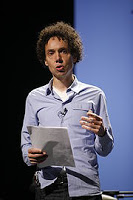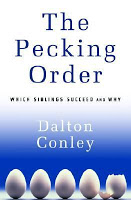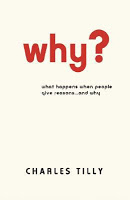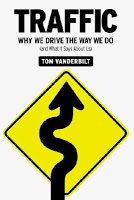 Outliers: the story of success by Malcolm Gladwell is catnip for the polymath. Written in a narrative style which is certain to please even die-hard fiction readers, Outliers presents a series of theories regarding success. This is excellent reading before going to a party. While reading, I found myself spouting off Gladwell’s ideas, much like Cliff Clavin at Cheers.
Outliers: the story of success by Malcolm Gladwell is catnip for the polymath. Written in a narrative style which is certain to please even die-hard fiction readers, Outliers presents a series of theories regarding success. This is excellent reading before going to a party. While reading, I found myself spouting off Gladwell’s ideas, much like Cliff Clavin at Cheers.
Outliers, themselves, are people who have achieved extraordinary success. (Think The Beatles and Bill Gates). Their success is due to many more factors than merely innate talent or a high IQ. Gladwell theorizes that success is due to a combination of many factors. Just as there is no one cause to a plane crash (many things have to go wrong before the plane drops out of the sky), many things have to go right before a person can be wildly successful. They must have innate ability. They must be born to a culture that fosters their ability. They must have family and friends that support their dreams. They must be born in a community that has access to the things they need in terms of education and resources. And most random of all, they must be born when the time is just right for them to exploit their skills.
 The sheer randomness of this theory makes you pause. A hockey player is more successful if born in the early part of the year; the most successful computer programmers were born in the 1950s; children of Jewish immigrants in the first part of the twentieth century (children of garment workers) went on to become doctors and lawyers, and so on.
The sheer randomness of this theory makes you pause. A hockey player is more successful if born in the early part of the year; the most successful computer programmers were born in the 1950s; children of Jewish immigrants in the first part of the twentieth century (children of garment workers) went on to become doctors and lawyers, and so on.
Add talent and merit to these circumstances and you still don’t have enough to achieve success. Next you must have dedication and perseverance. Ten thousand hours is the magical number. Gladwell claims that the Beatles would not have achieved their success had they not gone to Hamburg and play eight hours a day, seven days a week. Most important of all is to have the vision to seize the opportunities put in front of you. Bill Gates managed to put in his ten thousand hours of computer programming in the 1960’s when computer time was not only expensive, but most difficult to access.
You may not agree with all of Gladwell’s theories, but I’m sure you will find this to be a thought provoking read which explores the subtleties and eccentricities of human nature.
If you enjoy reading books which attempt to make sense of society and human nature, you might also like to try these titles: The Pecking Order: which siblings succeed and why by Dalton Conley – “We want to think of the family as a haven, a sheltered port from the maelstrom of social forces that rip through our lives. Within the family, we like to think, everyone starts out on equal footing. And yet we see around us evidence that siblings all too often diverge widely in social status, wealth, and education. We think these are aberrant cases; the president and the drug addict, the professor and the convict. Surely in most families, in our families, all children will succeed equally, and when they don’t, we turn to one-dimensional answers to explain the discrepancy; birth order, for instance, or gender.” – publisher
The Pecking Order: which siblings succeed and why by Dalton Conley – “We want to think of the family as a haven, a sheltered port from the maelstrom of social forces that rip through our lives. Within the family, we like to think, everyone starts out on equal footing. And yet we see around us evidence that siblings all too often diverge widely in social status, wealth, and education. We think these are aberrant cases; the president and the drug addict, the professor and the convict. Surely in most families, in our families, all children will succeed equally, and when they don’t, we turn to one-dimensional answers to explain the discrepancy; birth order, for instance, or gender.” – publisher
 Why by Charles Tilly – “Why? is a book about the explanations we give and how we give them–a fascinating look at the way the reasons we offer every day are dictated by, and help constitute, social relationships. Written in an easy-to-read style by distinguished social historian Charles Tilly, the book explores the manner in which people claim, establish, negotiate, repair, rework, or terminate relations with others through the reasons they give. Tilly examines a number of different types of reason giving. For example, he shows how an air traffic controller would explain the near miss of two aircraft in several different ways, depending upon the intended audience: for an acquaintance at a cocktail party, he might shrug it off by saying “This happens all the time,” or offer a chatty, colloquial rendition of what transpired; for a colleague at work, he would venture a longer, more technical explanation, and for a formal report for his division head he would provide an exhaustive, detailed account.” – publisher
Why by Charles Tilly – “Why? is a book about the explanations we give and how we give them–a fascinating look at the way the reasons we offer every day are dictated by, and help constitute, social relationships. Written in an easy-to-read style by distinguished social historian Charles Tilly, the book explores the manner in which people claim, establish, negotiate, repair, rework, or terminate relations with others through the reasons they give. Tilly examines a number of different types of reason giving. For example, he shows how an air traffic controller would explain the near miss of two aircraft in several different ways, depending upon the intended audience: for an acquaintance at a cocktail party, he might shrug it off by saying “This happens all the time,” or offer a chatty, colloquial rendition of what transpired; for a colleague at work, he would venture a longer, more technical explanation, and for a formal report for his division head he would provide an exhaustive, detailed account.” – publisher
 Traffic: why we drive the way we do (and what it says about us) by Tom Vanderbilt – “In this brilliant, lively, and eye-opening investigation, Tom Vanderbilt examines the perceptual limits and cognitive underpinnings that make us worse drivers than we think we are. He demonstrates why plans to protect pedestrians from cars often lead to more accidents. He uncovers who is more likely to honk at whom, and why. He explains why traffic jams form, outlines the unintended consequences of our quest for safety, and even identifies the most common mistake drivers make in parking lots. Traffic is about more than driving: it’s about human nature. It will change the way we see ourselves and the world around us, and it may even make us better drivers.” – publisher
Traffic: why we drive the way we do (and what it says about us) by Tom Vanderbilt – “In this brilliant, lively, and eye-opening investigation, Tom Vanderbilt examines the perceptual limits and cognitive underpinnings that make us worse drivers than we think we are. He demonstrates why plans to protect pedestrians from cars often lead to more accidents. He uncovers who is more likely to honk at whom, and why. He explains why traffic jams form, outlines the unintended consequences of our quest for safety, and even identifies the most common mistake drivers make in parking lots. Traffic is about more than driving: it’s about human nature. It will change the way we see ourselves and the world around us, and it may even make us better drivers.” – publisher



